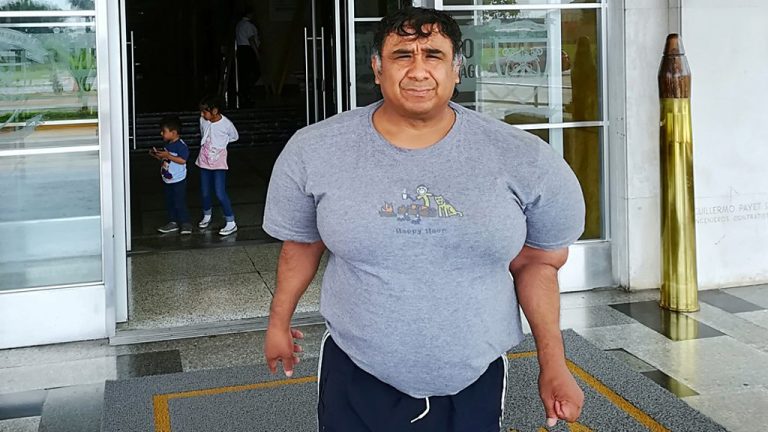For the past 15 years, factory owner Kamal Parmar has been running an after-school program for slum kids in Ahmedabad, India, helping them with basic skills like reading and writing and even preparing for their school tests.
Parmar’s story begins one afternoon 15 years ago. He was standing outside his metal fabrication workshop, near the slums of the Bhudarpura neighborhood, when he met a few kids returning home from the local municipal school. They were ecstatic about the end of their exams, which they claimed to have aced, so he decided to stop them and ask them a few questions. That’s when he made a shocking discovery – the students, even the older ones, did not know how to read.
“I took their exam paper and asked a few questions to some of them,” he says in a 2014 documentary titled Footpath School. “But none of them knew any answers. I thought to ask a few others. I asked them to read, but they did not even know how to read. Surprised, I asked them what did they write in their exams. All they knew was identifying the alphabet. And that left me thinking that something should be done for these children. And that is how, 15 to 17 years back I started this school.”

Photo: Humans of Amdavad/Facebook
First, Parmar spoke to 400 students who lived in the area and discovered that only five were literate. So he invited the kids to visit his home every evening, where he set up a makeshift classroom with metal desks made at his own workshop. Despite being a school dropout himself, the factory worker planned to teach them everything he knew – right from the alphabet to preparing for school tests – while focusing patiently on the needs of each individual student.
The humble school started off with 10 students, but over the years, Parmar managed to attract more students with a simple strategy – delicious dinners prepared right outside his school. “I teach them for two hours every day, and then we all have dinner together,” he said, speaking to Humans of Amdavad, a Facebook page that documents stories from the people from the Indian city. “Dinner doesn’t include simple Roti-Sabji, I provide them with hygienic and fancy dishes like Pav-Bhaji, Chana Puri, Idli-Sambhar, and also sweets. Due to dinner a lot of students are attracted here. I also take them to picnic once in a year.”

Photo: Footpath School Ambawadi
Today, the Footpath School has a total of 155 students and many of the kids that Parmar has taught in the past 15 years have gone on to attend college and build successful careers. “One of my girl student recently became Manager at a bank, then one of the students became a computer engineer, the other one became a mechanical engineer, and one of the girls is applying for medical, and the list continues. Imagine, those who couldn’t read and write are now engineers and doctors and managers at a bank. For me, this is success.”
Despite having studied only till the seventh grade, Parmar says he’s been able to teach the kids by devising innovative techniques. “I too began to learn along with the girls who studied further,” he explained in the documentary film. “Even at present, I teach around 50 girls in my own way. I ask them to read first. After reading I ask them to form questions on their own and read them out. This way they themselves form questions and also find the answers. In six months they learn all seven subjects like this – by forming questions, finding answers and learning them by-heart.”

Photo: Footpath School Ambawadi
“I often ask the municipal school staff, why children learn so little in their school,” he said, speaking to The New Indian Express. “Children love coming here. We teach them about our country, democracy, and what it is like being an Indian.”
“So far I have analysed one thing,” said Ronak Solanki, one of Parmar’s first students. “From all the students who were with me in the Municipal School, no one is studying today. They have not even passed 10th. He has supported us to a great extent. When we were required to enrol for our 10th standard tuitions, he provided us the tuition fees. Even our 11th and 12th science stream tuition fees were paid by him.”

Photo: Footpath School Ambawadi
Parmar’s family has been very supportive of his project, and are proud to see how much of an impact he has had on the kids in the neighborhood. In fact, when he first expressed desire to start the school, his two sons took over the workshop so he would have all the time he needed. “Since childhood we have seen our father doing social work, and we used to feel very proud of him,” said Gautam Parmar, one of the sons. “If we two brothers weren’t there to run the garage, then probably he would have continued to run it. But we saw that he loved to do social work, so I and my brother decided to stick to our garage business and let him do his social work.”
According to Parmar, one of the best aspects of the Footpath School is that he doesn’t have to recruit any teachers. Ten of his ex-students are currently serving as teachers at the school, and he also has volunteers stopping by from all over the world. Many of them sponsor meals for the children as well – around 20 to 25 of the dinners served in a month are paid for through generous donations.

Photo: Footpath School Ambawadi
“My experience with these kids was amazing,” said Reema Shah, a school teacher who volunteers at the Footpath School. “One day I was passing through the street. I saw them learning, so I got down from my scooter and taught them for just 30 minutes. After that the love and affection I got from them was unbelievable. These children don’t get proper benches to sit, have no silence zone classrooms, the vehicles passing by make lots of noise, yet they pay 100 percent concentration on what teachers tell them. This touched my heart.”
For those who are inspired by his story, but cannot actually volunteer at the Footpath School, Parmar has a simple piece of advice: “Try to educate just one child a year, and see the difference it makes to the society.”
“I have always valued education. And when these children don’t get it right, I feel we should think of something for them,” the inspiring roadside teacher concludes.
Kumar Parmar’s dedication towards education reminds of Rajesh Kumar Sharma, who set up a similar school under a bridge in New Delhi, where he teaches children from the city’s slums too poor to attend regular schools.













